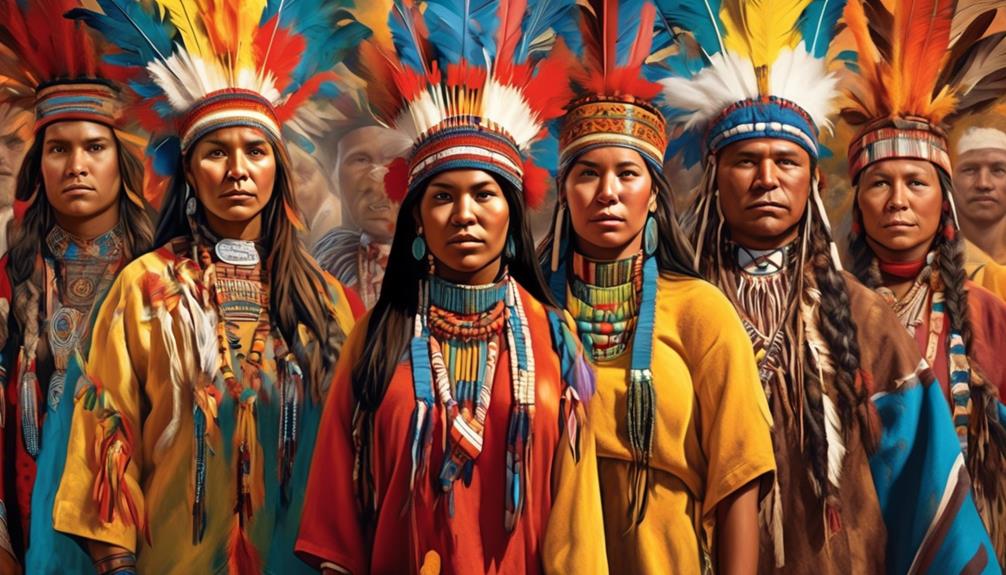The Uluru Statement From the Heart is a powerful call for Australia to recognize Indigenous sovereignty, respect their land, culture, and traditions, and establish a treaty. It urges you to listen deeply to First Nations peoples’ voices and acknowledge their rightful place in the country’s story. The statement also advocates for enshrining a First Nations Voice in the Constitution to ensure respectful, ongoing participation. If you want to understand how this all fits into Australia’s future, you’ll find more details as you explore further.
Key Takeaways
- The Uluru Statement calls for recognition of Indigenous sovereignty, emphasizing respect for First Nations peoples’ culture, land, and self-determination.
- It advocates for a First Nations Voice enshrined in the Australian Constitution to influence laws affecting Indigenous communities.
- Recognizing sovereignty does not mean ceding all authority but honoring inherent rights rooted in land and culture.
- The statement seeks to establish treaties to address past injustices and promote genuine reconciliation.
- It invites Australia to embrace a more honest, inclusive future centered on respect, recognition, and partnership with First Peoples.

Have you ever wondered what the Uluru Statement From the Heart really means for Australia’s future? It’s a powerful call for change, demanding recognition of Indigenous sovereignty and a pathway toward treaty recognition. The statement emphasizes that Australia’s history isn’t complete without acknowledging the First Nations peoples and their rightful place within the nation’s story. At its core, it asks Australians to listen deeply to Indigenous voices and respect their desire for self-determination.
Indigenous sovereignty doesn’t mean handing over all authority but recognizing that First Nations peoples have always had a form of sovereignty rooted in their culture, land, and traditions. The Uluru Statement advocates for this recognition to be enshrined in the national consciousness and, ideally, in the constitution. It’s about acknowledging that Indigenous Australians have a unique relationship with their land that predates colonization, and that this connection continues to be indispensable today. When we talk about Treaty recognition, it’s a step toward formalizing this relationship. Treaties are seen as a way to settle historical grievances, establish mutual respect, and create a foundation for genuine reconciliation. They would be agreements that acknowledge past wrongs and set clear terms for how Indigenous communities and the government can work together moving forward.
Indigenous sovereignty is rooted in culture, land, and traditions, deserving recognition in Australia’s conscience and constitution.
The statement calls for a First Nations Voice to be enshrined in the Australian Constitution, giving Indigenous peoples a say in laws and policies that affect them. This isn’t just symbolic; it’s about practical change. When Indigenous communities have a seat at the table, policies can be more effective and respectful of their needs and aspirations. It’s a recognition that Indigenous peoples should have control over decisions that impact their lives, lands, and futures. The Uluru Statement isn’t just about symbolic gestures—it’s about transforming the relationship between Indigenous Australians and the broader nation into one based on respect, recognition, and partnership.
In essence, the Uluru Statement from the Heart is Australia’s invitation to embrace a more honest, inclusive future. It urges us to recognize Indigenous sovereignty, respect their right to self-determination, and work toward treaty recognition as a step toward genuine reconciliation. When you understand these core ideas, you see that the statement isn’t just about words; it’s about shaping a nation that values and respects its First Peoples. It’s an urgent call for justice and a chance to build a more unified, fairer Australia where everyone’s history and identity are acknowledged and celebrated. Recognizing Indigenous sovereignty is essential for moving forward with respect and fairness.
Understanding the Uluru Statement From the Heart book
As an affiliate, we earn on qualifying purchases.
As an affiliate, we earn on qualifying purchases.
Frequently Asked Questions
How Does the Uluru Statement Impact Australian Constitutional Law?
The Uluru Statement from the Heart calls for legal recognition of Indigenous Australians, which could lead to constitutional amendments. You’re impacted because these changes aim to embed Indigenous voices into Australia’s legal framework. This influences how laws are made and interpreted, ensuring Indigenous Australians have a say in policies affecting them. Ultimately, it’s about transforming the constitution to better acknowledge and protect Indigenous rights and sovereignty.
What Are the Main Cultural Significances of Uluru Itself?
You see, Uluru holds deep cultural significance as a sacred site deeply connected to Aboriginal spirituality. It’s more than just a rock; it’s a symbol of Dreamtime stories, ancestral beings, and spiritual practices. For Aboriginal communities, Uluru is a sacred site that embodies their cultural identity and spiritual connection to the land, making it a powerful representation of their heritage and spiritual beliefs.
How Have Indigenous Communities Responded to the Uluru Statement?
You see that Indigenous communities have responded positively to the Uluru Statement, emphasizing cultural recognition and land rights. They believe it’s a crucial step toward acknowledging their connection to land and history. Many community leaders actively support its call for a constitutionally enshrined voice for Indigenous Australians. Their responses highlight a desire for genuine respect, recognition, and improved land rights, fostering hope for a more inclusive future.
What Are the Next Steps for Implementing the Uluru Statement?
You’re at a pivotal point, working towards meaningful change. To implement the Uluru Statement, focus on legal reforms that honor Indigenous voices and foster community engagement. You’ll need to build trust through ongoing dialogue, ensuring Indigenous communities are actively involved. By prioritizing these steps, you help create a more inclusive future, respecting the deep connections and aspirations expressed in the statement, and turning hopes into tangible progress.
How Does the Uluru Statement Compare to Other Indigenous Treaties Worldwide?
You see that the Uluru Statement shares similarities with colonial treaties and international agreements, as it seeks recognition and rights for Indigenous peoples. Unlike many treaties worldwide, it emphasizes moral and symbolic reconciliation rather than legal binding. While other international agreements aim for land rights or sovereignty, the Uluru Statement uniquely calls for a First Nations voice in Australia’s constitution, highlighting a path toward genuine recognition and partnership.
![Teacher's Discovery Native American Cultures Map Poster [Historical/Cultural] [Educational Prints] [24 x 36 Inch] [Laminated]](https://m.media-amazon.com/images/I/51SIReSYumL._SL500_.jpg)
Teacher's Discovery Native American Cultures Map Poster [Historical/Cultural] [Educational Prints] [24 x 36 Inch] [Laminated]
As an affiliate, we earn on qualifying purchases.
As an affiliate, we earn on qualifying purchases.
Conclusion
By understanding the Uluru Statement from the Heart, you recognize its call for meaningful change. Did you know that over 80% of Australians support a constitutionally recognized First Nations Voice? This shows the nation’s growing willingness to listen and act. Embracing this statement can help bridge gaps and foster reconciliation. So, stay informed and be part of the movement towards a more inclusive future for all Australians.

National Geographic Australia Wall Map – Classic (30.25 x 27 in) (National Geographic Reference Map)
As an affiliate, we earn on qualifying purchases.
As an affiliate, we earn on qualifying purchases.
Reconciliation and treaty awareness kit
As an affiliate, we earn on qualifying purchases.
As an affiliate, we earn on qualifying purchases.









